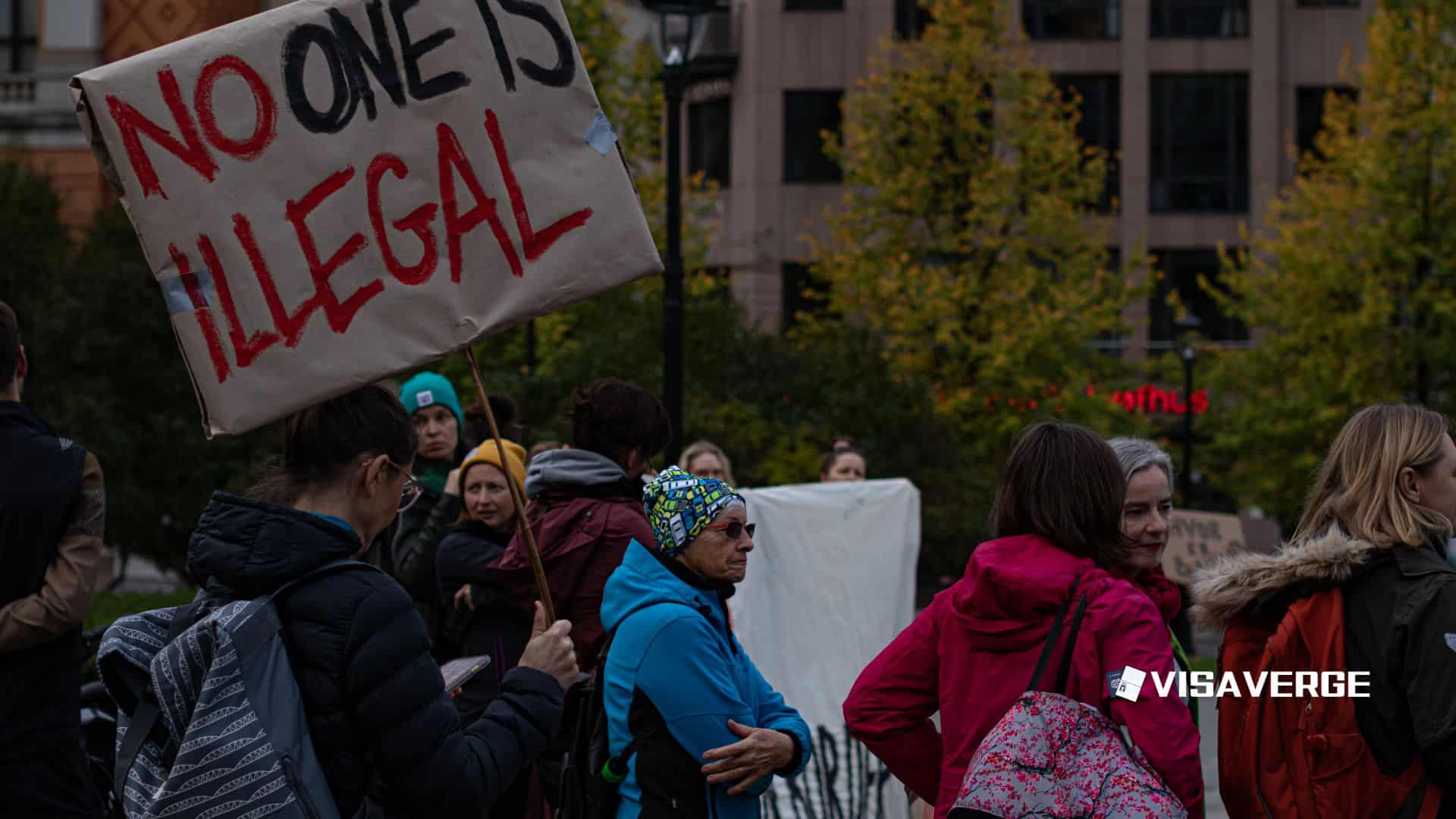Key Takeaways
• Los Angeles County Supervisors approved aid to support immigrant families after July 2025 ICE raids.
• Aid plan expands health services, food support, and helps parents prepare for family separation.
• Legal experts advise knowing rights, preparing documents, and using rapid response networks.
Los Angeles County Supervisors have approved a major aid plan for immigrant families after a wave of ICE raids swept through Southern California in July 2025. The Board’s decision comes as federal agents increase immigration enforcement, targeting parking lots, swap meets, workplaces, and even schools. The move aims to help families facing fear, confusion, and separation as a result of these actions.
The Board’s vote follows weeks of tension and anxiety in immigrant neighborhoods. Many families worry about sudden arrests, losing access to healthcare, and being separated from loved ones. The Los Angeles County Supervisors say their new plan will expand health and social services, provide food support, and help parents prepare for possible family separation.

Why the Aid Plan Matters Now
The recent ICE raids have sparked strong reactions across Los Angeles County. Federal agents, sometimes in masks and plain clothes, have appeared at unexpected places, causing panic among residents. Some raids have involved military-style force and National Guard troops, which many community leaders call excessive and frightening.
Iliana Perez, Executive Director of Immigrants Rising, called the raids a “coordinated campaign of fear, escalation, and cruelty” that targets hardworking immigrant communities. Supervisor Hilda Solis explained that these actions have created a “chilling effect,” making people afraid to seek help, even for basic needs like healthcare and food.
Supervisor Lindsey Horvath added that the administration’s actions go against its claims of supporting family values. She stressed the need for more support for immigrant families, especially as children and parents face the risk of being separated.
What the Los Angeles County Supervisors’ Plan Includes
The aid plan approved by the Los Angeles County Supervisors is designed to meet the urgent needs of immigrant families affected by ICE raids. The plan focuses on three main areas:
- Health Services Expansion
- The departments of Health Services, Mental Health, Children and Family Services, Public Social Services, and Public Health will work closely with the Office of Immigrant Affairs.
- They will study how the raids are affecting people’s ability to get medical care, mental health support, and other vital services.
- The goal is to make sure everyone, regardless of immigration status, can access the help they need without fear.
- Food Insecurity Support
- Many families are now afraid to leave their homes, even to buy groceries.
- The plan will provide home-delivered groceries and meals, connecting local food providers with community organizations.
- This support aims to prevent hunger and make sure children and adults have enough to eat during this difficult time.
- Parental Support and Family Preparedness
- The county will develop resources to help parents plan for the possibility of separation.
- This includes information on how to designate guardians for their children and how to express their wishes for where their children should go if they are detained.
- These steps can help reduce the trauma of sudden family separation.
Community Leaders and Legal Experts Speak Out
Community leaders and legal experts have raised serious concerns about the way ICE raids are being carried out. Marissa Montes, Director of Loyola Law School’s Immigrant Justice Clinic, warned about the risk of racial profiling and the use of excessive force. She stressed the importance of knowing and asserting constitutional rights during encounters with immigration agents.
Sergio Perez, Executive Director of the Center for Human Rights and Constitutional Law, advised families to prepare in advance. He recommends gathering important documents, such as birth certificates and medical records, and using rapid response networks to help locate detained family members quickly.
These experts say that while the Los Angeles County Supervisors’ plan is a positive step, families still need to know their rights and have a plan in case of detention or separation.
How ICE Raids Affect Immigrant Families
The impact of ICE raids goes far beyond the individuals who are detained. When parents are arrested, children may be left without caregivers. Families may lose their main source of income, making it hard to pay rent or buy food. Fear of being targeted can also keep people from going to the doctor, sending their children to school, or seeking help from the police.
Supervisor Hilda Solis explained, “When people are afraid to access basic services, it puts the whole community at risk.” She pointed out that public health depends on everyone being able to get medical care and food, especially during emergencies.
The raids have also caused confusion because agents sometimes wear plain clothes or masks, making it hard for people to know who they are dealing with. This has led to reports of mistaken identity and increased anxiety in neighborhoods with large immigrant populations.
What Families Can Do to Protect Themselves
Legal experts and community groups are urging families to take steps to protect themselves in case of an ICE raid. Here are some important actions:
- Know Your Rights: Everyone in the United States 🇺🇸, regardless of immigration status, has certain rights. You do not have to open your door to ICE agents unless they have a signed warrant from a judge. You have the right to remain silent and to speak to a lawyer.
- Prepare Important Documents: Keep copies of birth certificates, passports, medical records, and emergency contact information in a safe place. Make sure trusted family members or friends know where to find them.
- Designate a Guardian: Parents should consider filling out forms to name a temporary guardian for their children in case they are detained. This can help ensure that children are cared for by someone they trust.
- Use Rapid Response Networks: Many counties have rapid response hotlines that can help locate detained individuals and provide legal support. These networks can also send legal observers to document ICE activity.
Key Resources for Immigrant Families
Several organizations and hotlines are available to help families affected by ICE raids:
- CHIRLA (Coalition for Humane Immigrant Rights): 213-353-1333
- San Bernardino/Riverside Rapid Response: 909-361-4588
- Kern County Rapid Response: 661-432-2230
- Central Valley Rapid Response: 559-206-0151
- Orange County Rapid Response: 714-881-1558
These hotlines can provide information, connect families with legal help, and offer support during emergencies.
For more information about your rights during an ICE encounter, you can visit the official U.S. Citizenship and Immigration Services (USCIS) Know Your Rights page.
Background: Why Are ICE Raids Increasing?
The recent increase in ICE raids is part of a broader push by federal authorities to enforce immigration laws more strictly. Critics argue that these actions are meant to create fear and discourage immigrants from living openly in their communities. Supporters of the raids say they are necessary to enforce the law and remove people who are in the country without permission.
The use of military force and National Guard troops has drawn special criticism. Many community leaders say this approach is too aggressive and makes families feel like they are living in a war zone. According to analysis by VisaVerge.com, these tactics can damage trust between immigrant communities and local government, making it harder for public agencies to do their jobs.
How Local and Federal Authorities Clash Over Immigration
Los Angeles County Supervisors have often found themselves at odds with federal immigration authorities. The county has a long history of supporting immigrant rights and providing services regardless of immigration status. This approach is based on the belief that healthy, stable families make the whole community stronger.
Federal authorities, on the other hand, argue that local governments should cooperate with ICE to enforce immigration laws. This disagreement has led to legal battles and public protests in the past. The current situation highlights the ongoing tension between local efforts to protect immigrant families and federal policies focused on enforcement.
Implications for Schools, Workplaces, and Public Spaces
The ICE raids have affected many parts of daily life in Los Angeles County. Parents are afraid to send their children to school, worried that they might be picked up by agents. Workers fear raids at their jobs, which can lead to lost wages and sudden unemployment. Even public spaces like swap meets and parking lots have become targets, making people feel unsafe in places they once trusted.
Supervisor Lindsey Horvath stressed that these actions go against the values of family and community. She called for more support for immigrant families, saying, “We need to stand with our neighbors and make sure they have what they need to stay healthy and safe.”
What Comes Next for Immigrant Families in Los Angeles County
The aid plan approved by the Los Angeles County Supervisors is an important step, but it is not a complete solution. Community groups and legal experts say that ongoing advocacy and support will be needed as long as ICE raids continue.
Families are encouraged to stay informed, connect with local organizations, and make plans to protect themselves. Schools, clinics, and community centers are also working to provide safe spaces and accurate information.
Solution-Oriented Steps for the Community
- Stay Connected: Join local community groups and attend meetings to stay updated on changes in immigration policy and enforcement.
- Educate Others: Share information about rights and resources with friends, family, and neighbors.
- Support Local Organizations: Volunteer or donate to groups that provide legal aid, food, and other support to immigrant families.
- Advocate for Change: Contact local officials and urge them to continue supporting policies that protect immigrant families.
Conclusion: Building a Safer Community for All
The Los Angeles County Supervisors’ decision to expand aid for immigrant families shows a commitment to protecting the most vulnerable residents. While the threat of ICE raids remains, the county’s plan offers hope and practical help to those in need.
By working together—families, community groups, and local government—Los Angeles County can help ensure that everyone has access to health care, food, and safety, no matter where they were born. The situation is still changing, but with the right support and information, immigrant families can face these challenges with greater strength and confidence.
For more details on your rights and available resources, visit the USCIS Know Your Rights page or contact one of the hotlines listed above. Staying informed and prepared is the best way to protect yourself and your loved ones during these uncertain times.
Learn Today
ICE raids → Enforcement actions by Immigration and Customs Enforcement targeting immigrants for detention or deportation.
Rapid response networks → Community groups providing legal help and locating detained immigrants quickly during enforcement actions.
Family separation → The forced separation of children from parents after immigration detention.
Immigrant families → Families with at least one member who is not a U.S. citizen or permanent resident.
Health services expansion → Increasing access to medical and mental health care for vulnerable populations amid crises.
This Article in a Nutshell
Los Angeles County approved a major aid plan addressing immigrant families’ urgent needs amid widespread ICE raids. The plan expands health services, provides food support, and offers legal and parental resources to protect families from fear and separation during aggressive immigration enforcement.
— By VisaVerge.com













